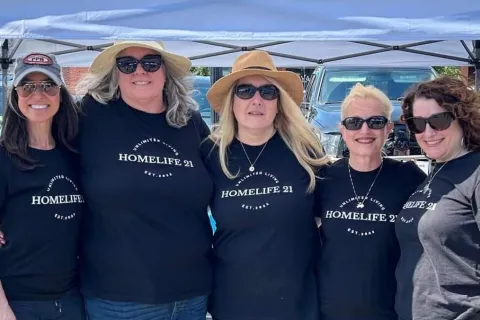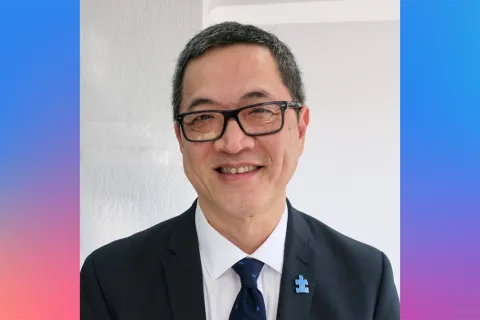Meet Daniel T.
Daniel T.
If we can learn anything from Daniel it’s that everyone may face problems and struggles, but in time, you can overcome them with the right support system. We couldn’t be more grateful for everyone who has helped us along the way.
With global data indicating that the vast majority of adults with autism are either unemployed or underemployed, Dubuque, Iowa, resident Katherine Toops knew that helping her autistic son Daniel find meaningful work as an adult would come with its challenges.
Diagnosed in 1999 at age three, Daniel, or “Toops” as his friends call him, has faced many challenges throughout his life; crowded rooms, loud noises, asymmetrical patterns, unexpected change, understanding social protocols and the inability to communicate using words are just some of the obstacles he’s faced. Early intervention services and years of therapies helped mitigate some of these struggles for Daniel, but Katherine always worried it wasn’t enough for her son to reach his full potential. So, like most caring parents would do when their child’s future was in limbo, she met with his teachers, scoured the internet for resources and developed a plan of action to find her son the ideal job.
“Daniel’s Individualized Education Program (IEP) team met in May 2014 to start a transition plan during his high school year,” Katherine shared. “The team initially struggled to find a work experience that would be a good fit for him because of his autism, obsessive compulsive disorder and inability to communicate with words. I left the meeting feeling very frustrated and knew I had to take things into my own hands.”
For Katherine, this frustration and worry sparked an idea – illuminating a pathway for Daniel and other adults on the spectrum to find meaningful employment.
“After the meeting I started searching the internet for work activities that Daniel could complete while following a picture schedule and task cards. I put together three different jobs he’d be able to complete using these cards. The first was to make homemade laundry detergent. Daniel was easily able to make the product, but we didn’t have an outlet for sales, so we donated the soap to a women’s shelter. The second was tying fleece blankets. Unfortunately, Daniel wasn’t very interested in the process and just laughed as he watched me and the other adults who volunteered to help with the project. The third and final option was making fire starters, which was an instant success! Daniel excelled at this activity because the process has many steps, which is appealing to him.”
JT FireStarters are made from 100% recycled materials donated by the local community. Each fire starter is made from a cardboard egg carton pod, shredded paper, dryer lint and melted candle wax. Paper is shredded, labels placed on bags, egg cartons broken apart and then the assembly process begins. The work steps are clearly defined with a beginning point and an ending point – the ideal task for Daniel.
In June 2015, JT FireStarters received their first order for 70 bags. Since then, the business has flourished as the product is now sold in 130 stores throughout seven states. Daniel’s mom credits the success of the business to an abundance of support from their local community and a business grant from vocational rehabilitation that provides first time business owners essential tools to get up and running. Katherine says now that JT FireStarters is growing, she hopes they can soon begin to hire paid employees and provide other people on the spectrum with meaningful work.
“We are proud of Daniel for who he is and what he has accomplished. He has worked with his job coaches for the past five years to make JT FireStarters the success it is today. If we can learn anything from Daniel it’s that everyone may face problems and struggles, but in time, you can overcome them with the right support system. We couldn’t be more grateful for everyone who has helped us along the way.”
Learn more about Daniel and his autism journey through the words of his mom, Katherine, in this Q&A:
What spurred you to get Daniel diagnosed for autism?
Daniel was not making eye contact, not talking and not answering to his name.
What thoughts first ran through your head when he was diagnosed?
I honestly could not believe Daniel had autism. This was not supposed to happen to us. He was the first child with a disability born to our families (including extended family members). His diagnosis was VERY difficult to accept.
After you received the diagnosis, what were the next steps to getting your son the services and supports he needed?
After his diagnosis, Daniel started 3-year-old preschool in the morning and afternoon. He had additional outside therapies for speech, occupational therapy and physical therapy. Our life was filled with appointments.
Please share some of the things Daniel struggles with as a result of his autism.
Over the years, we have faced many challenges with Daniel. He did not like loud sounds, and he would NOT go into public bathrooms that had hand dryers.He did not like eating in crowded restaurants. He would crawl under the table. Consequently, we stopped eating in restaurants for a few years. In high school, Daniel thought the lunchroom was an "all you can eat buffet." The lunch ladies were not amused to say the least. Daniel had a phase where he would turn on water faucets and let the water run. This was short-lived thankfully. In his late teens to early 20s, Daniel wanted people to dress symmetrically. This took quite a while to overcome.
Now, Daniel likes routine and predictability. He struggles with change. He is not able to vocalize his needs. Family and staff must read his body language and gestures. He has had access to a multitude of communication systems, but Daniel is reluctant to use them.
Please share some of the things at which he excels.
Daniel excels at puzzles, patterns and finding things that are out of order. Lately, he has adapted well to change.
Do you feel like people with autism have access to the same job opportunities as neurotypical people?
Daniel had access to job opportunities, but it was obvious that he would not be successful. He could apply for many jobs, but he would not be hired. I feel that our society is just at the beginning stages of hiring people with disabilities. It is easy to fill a job if the employee requires a few accommodations, but it’s challenging to find a position for someone with multiple physical and/or sensory needs. We (parents/advocates) need to hear about success stories of others who have paved the way in employment. As a parent, I often feel as if I must work twice as hard to accomplish something for Daniel.
What are some ways the job market and workplace could be more inclusive and accommodating to people with autism?
In the state of Iowa, people with disabilities need more job coaching hours. Hours are capped and individuals are only able to work 2.5 hours per day. This is not acceptable. People who can work should be allowed to work more hours. People are worth the financial investment and can be productive members of society, even if accommodations are needed.
What advice would you give to other people in the autism community who are ready to embark on a job search or preparing to enter the workforce?
Read this article by Temple Grandin. What are your interests and skills? What do you enjoy doing? Market yourself. Think outside the box. Have an advocate assist you in your search. Accept advice during the interview process and have your advocate monitor your progress at work. Make sure your advocate helps you navigate the challenges and obstacles that may hinder your success at work. Employers and co-workers must be educated about the needs of individuals with disabilities. Work breaks may look different for neurotypical individual – some need a break to take a walk or drink coffee - people need breaks for different reasons. The goal of employer and employee should be to tailor the work environment to best meet the needs of all involved.
What are five words that best describe your son?
Hardworking, intelligent, persistent, driven, blessed












